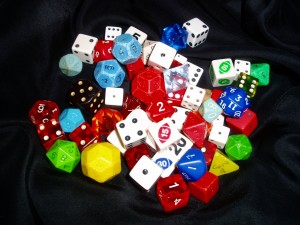It’s my firm belief that the Mass Effect trilogy is the future of video game storytelling.
For those who are not familiar with the games, a basic primer. Playing Mass Effect is like an action movie where you control the main character. That means you choose dialogue options, affecting how your character interacts with other characters; mission options, picking what your character will do and in what order; upgrades-as you advance in the game, you have points to spend at your discretion, allowing your character to become somewhat skilled in many fields or very skilled in a few-and combat.
Commander Shepard can be female or male, of any race. S/he can have romances with a variety of different characters, including alien and same-gender romances, or s/he can be utterly indifferent to romance. S/he can develop platonic friendships – or anger shipmates. S/he can make Paragon (virtuous) choices, Renegade (“badass”) choices, or a mixture of the two. Most importantly, saves from the first game can be carried over into the second; and then into the third. That means the possibilities for the future change, depending on the player’s decisions in the past-ie, what you did in the second game will change your options in the third. The end result is a storyline directly affected by the player’s input.
The series is not without its flaws. One common complaint is that a few plot points always lead to the same end, regardless of player input. For example, at the end of the first game, Commander Shepard can either encourage space cop Garrus to respect the institution of law enforcement and rejoin Citadel Security, or to reject the regulations as hurdles impeding justice. No matter which option is chosen, though, Garrus ends up in the same place at the start of the second game: hunting down criminals on a lawless space station.
Looking outside the story itself, my guess is that there was a question of practicality. Theoretically, if Garrus had stayed with the police (the Paragon version of Shepard’s advice), the developers would have had to create a whole new mission to encounter him in the second game. The time and cost of developing two wholly different missions to achieve the same end (getting Garrus to join your crew) was probably prohibitive. In-story, though, the second game focused on Garrus’ frustration with lawlessness, to justify his decision no matter what advice he received. I think that as technology improves and games become more powerful, it will be easier for developers to provide more complex options for players, and a wider variety of consequences for each decision made. Given the variety that already exists in Mass Effect, I’m pleased with the past, and anticipating the future.
Throughout the game, Commander Shepard is called upon to make moral judgments; to solve disagreements between characters; to make tough ethical decisions; to decide when to use force and when to try to talk out a problem. These choices shaped my concept of the character. My first Commander Shepard usually did the noble thing, but she made Renegade choices when she got angry. My second Commander Shepard was mostly renegade, but there were some lines even he wouldn’t cross. I developed an emotional attachment both to Commander Shepard and the characters with whom s/he interacted. And in every game, there are choices that can lead to those characters’ deaths. It’s not possible to complete the first game without at least one crew death, and it’s gut-wrenching every time, no matter who I lose.
This, I think, is the reason I keep playing Mass Effect over and over: the wedding of characterization and storytelling. The secondary characters are fleshed-out people who I want to spend time with. I could skip the dialogue and go right to the shooting, but I don’t want to. I have a lot of games where I can shoot things. I don’t have a lot of games where I can be whatever kind of hero I can imagine, interacting with characters I’ve come to care about, making decisions that have real consequences. I hope in the future, I’ll be playing a lot more games like this.

![Fable-01[1]](http://www.fictorians.com/wp-content/uploads/2013/08/Fable-011-300x225.jpg) A guest post by Jace Sanders.
A guest post by Jace Sanders. When I was a child, I considered myself lucky enough to own an original 8bit Nintendo Entertainment System. Even back then, I gravitated toward the role playing games, and deeply enjoyed the Zelda, Dragon Warrior, and Final Fantasy series. Even those games, in their primitive brilliance, were able to tell great stories.
When I was a child, I considered myself lucky enough to own an original 8bit Nintendo Entertainment System. Even back then, I gravitated toward the role playing games, and deeply enjoyed the Zelda, Dragon Warrior, and Final Fantasy series. Even those games, in their primitive brilliance, were able to tell great stories.